The Law Society and Age Discrimination: Equality Act 2010 Analysis
VerifiedAdded on 2023/01/12
|8
|1858
|31
Essay
AI Summary
This essay examines the pervasive issue of age discrimination and its impact on elderly individuals, particularly within the context of the UK legal system. It highlights that ageism, characterized by prejudice and stereotyping, significantly affects the rights and well-being of older people. The study emphasizes the importance of legal frameworks such as the Equality Act 2010 and the Employment Law 2002 in safeguarding the rights of the elderly and preventing discrimination. Case studies, including Rainbow vs Milton Keynes Council and Coleman v Attridge Law, illustrate instances of age-related discrimination and the legal challenges involved. The essay concludes that addressing age discrimination requires a comprehensive understanding and recognition of the issue to ensure fair treatment and protect the mental and physical health of elderly individuals. Desklib offers a range of resources, including solved assignments and past papers, to support students in their academic endeavors.
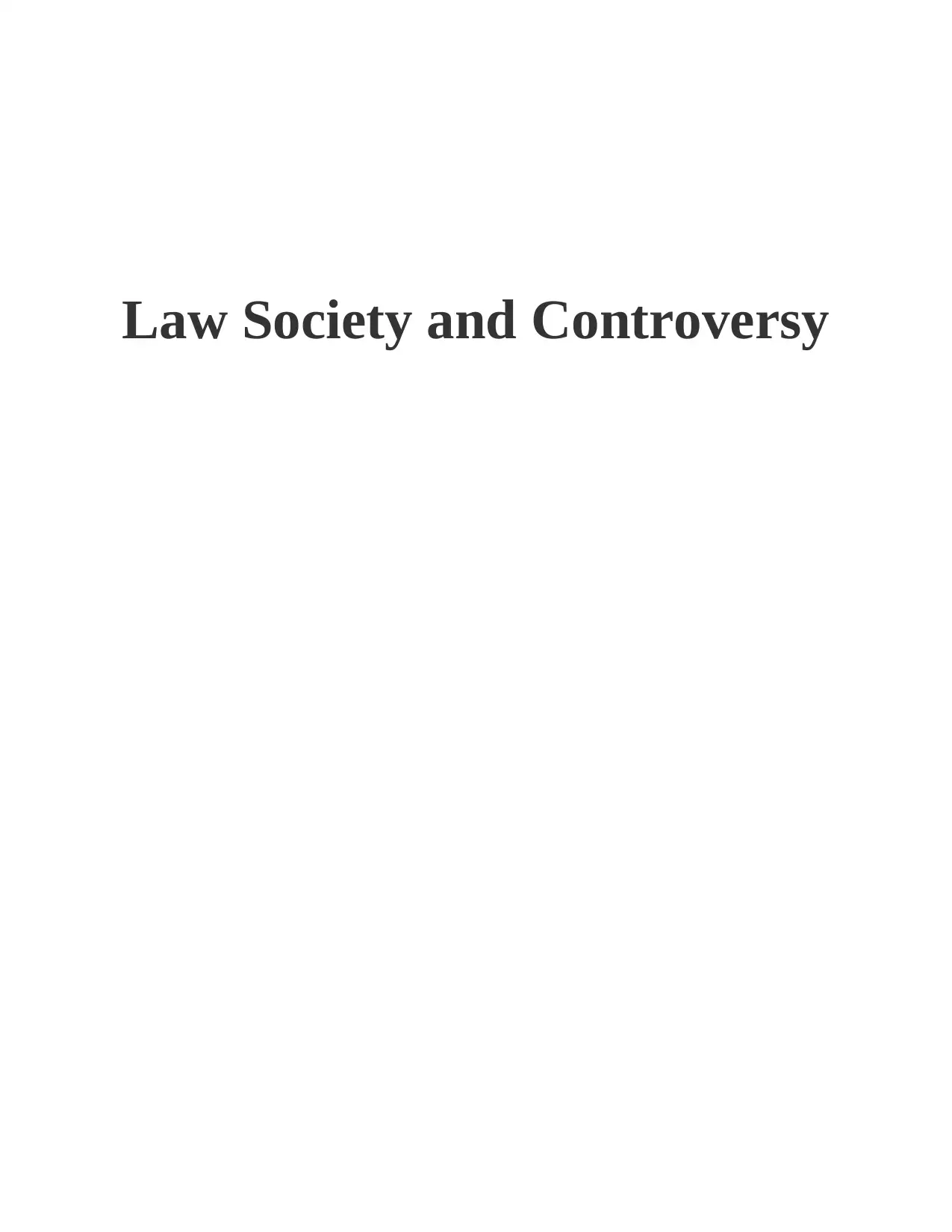
Law Society and Controversy
Paraphrase This Document
Need a fresh take? Get an instant paraphrase of this document with our AI Paraphraser
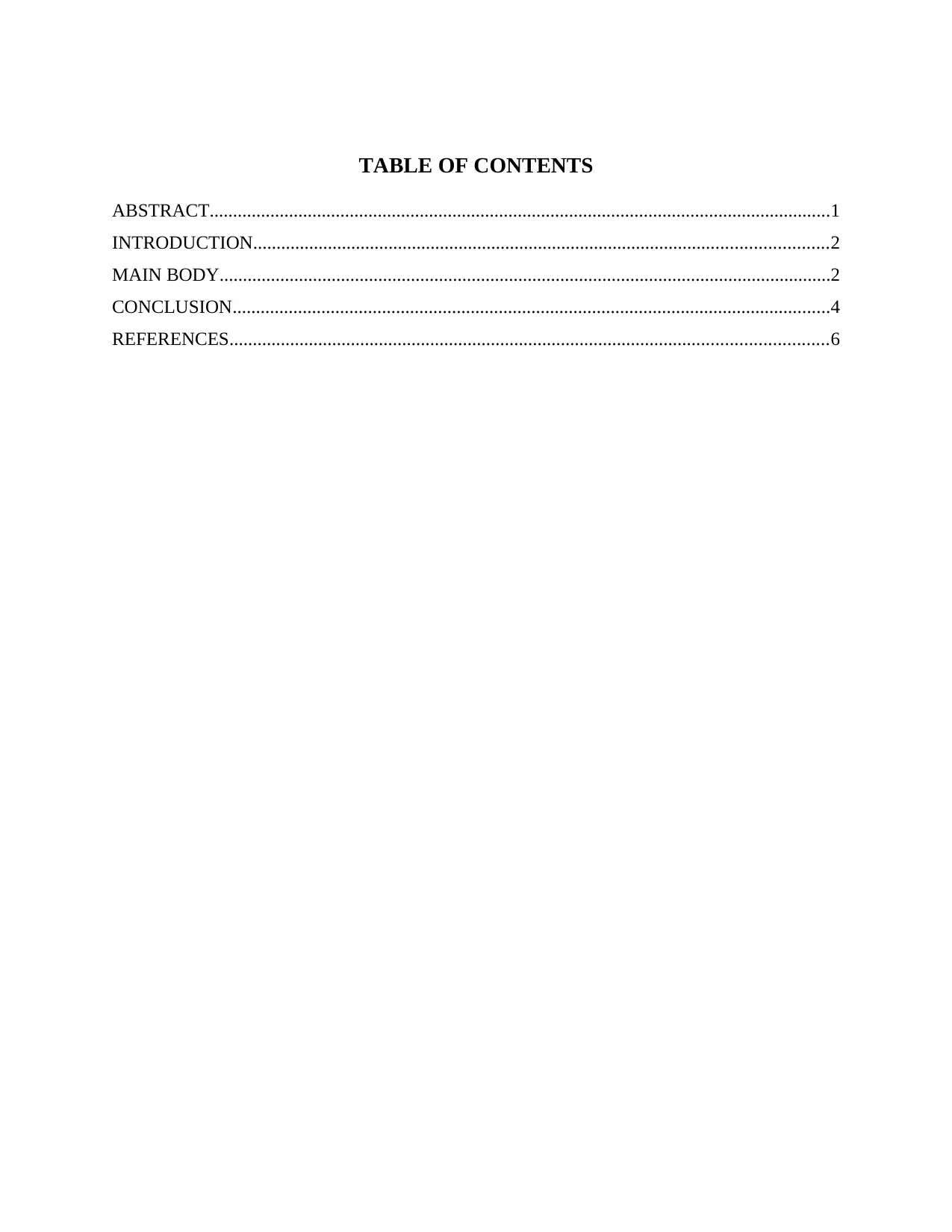
TABLE OF CONTENTS
ABSTRACT.....................................................................................................................................1
INTRODUCTION...........................................................................................................................2
MAIN BODY...................................................................................................................................2
CONCLUSION................................................................................................................................4
REFERENCES................................................................................................................................6
ABSTRACT.....................................................................................................................................1
INTRODUCTION...........................................................................................................................2
MAIN BODY...................................................................................................................................2
CONCLUSION................................................................................................................................4
REFERENCES................................................................................................................................6
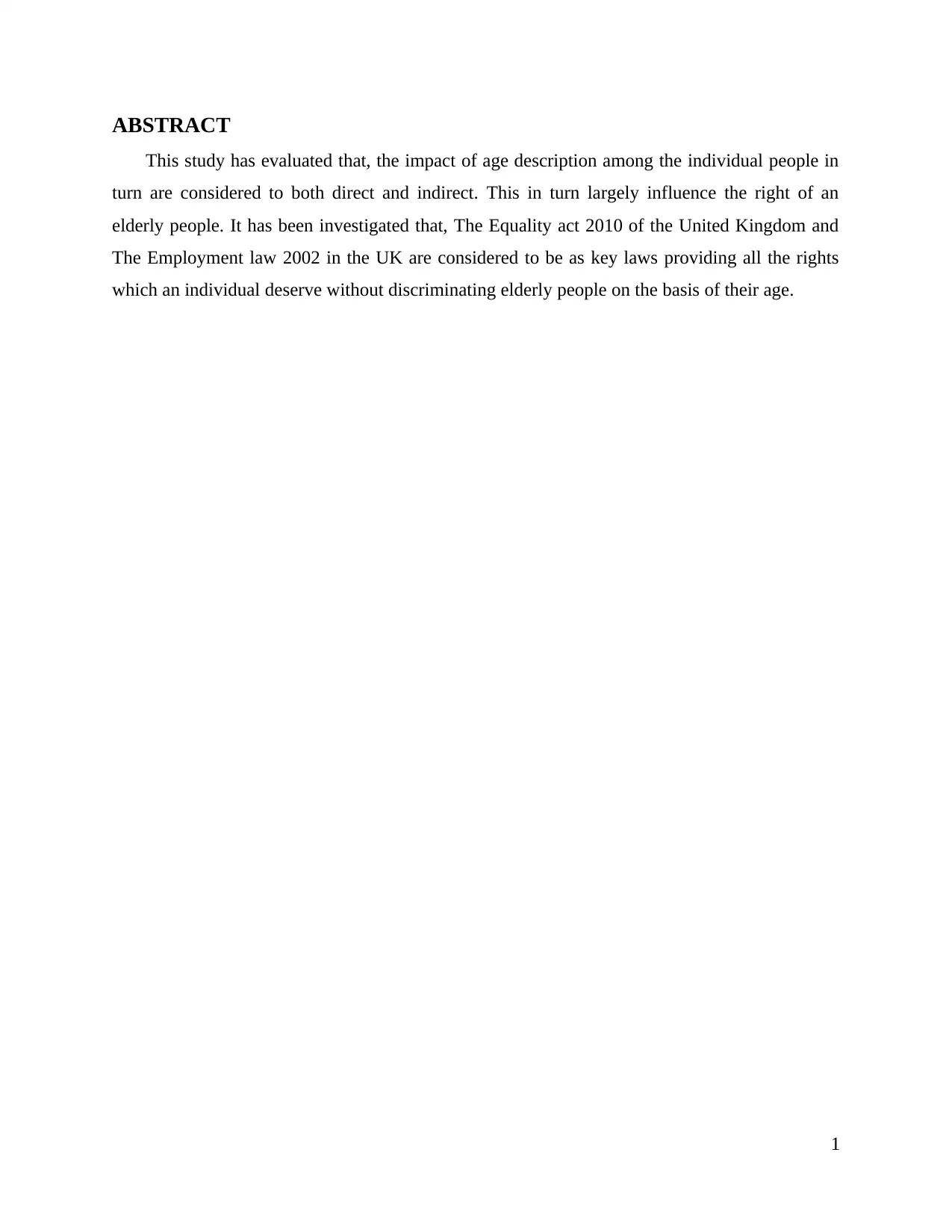
ABSTRACT
This study has evaluated that, the impact of age description among the individual people in
turn are considered to both direct and indirect. This in turn largely influence the right of an
elderly people. It has been investigated that, The Equality act 2010 of the United Kingdom and
The Employment law 2002 in the UK are considered to be as key laws providing all the rights
which an individual deserve without discriminating elderly people on the basis of their age.
1
This study has evaluated that, the impact of age description among the individual people in
turn are considered to both direct and indirect. This in turn largely influence the right of an
elderly people. It has been investigated that, The Equality act 2010 of the United Kingdom and
The Employment law 2002 in the UK are considered to be as key laws providing all the rights
which an individual deserve without discriminating elderly people on the basis of their age.
1
⊘ This is a preview!⊘
Do you want full access?
Subscribe today to unlock all pages.

Trusted by 1+ million students worldwide
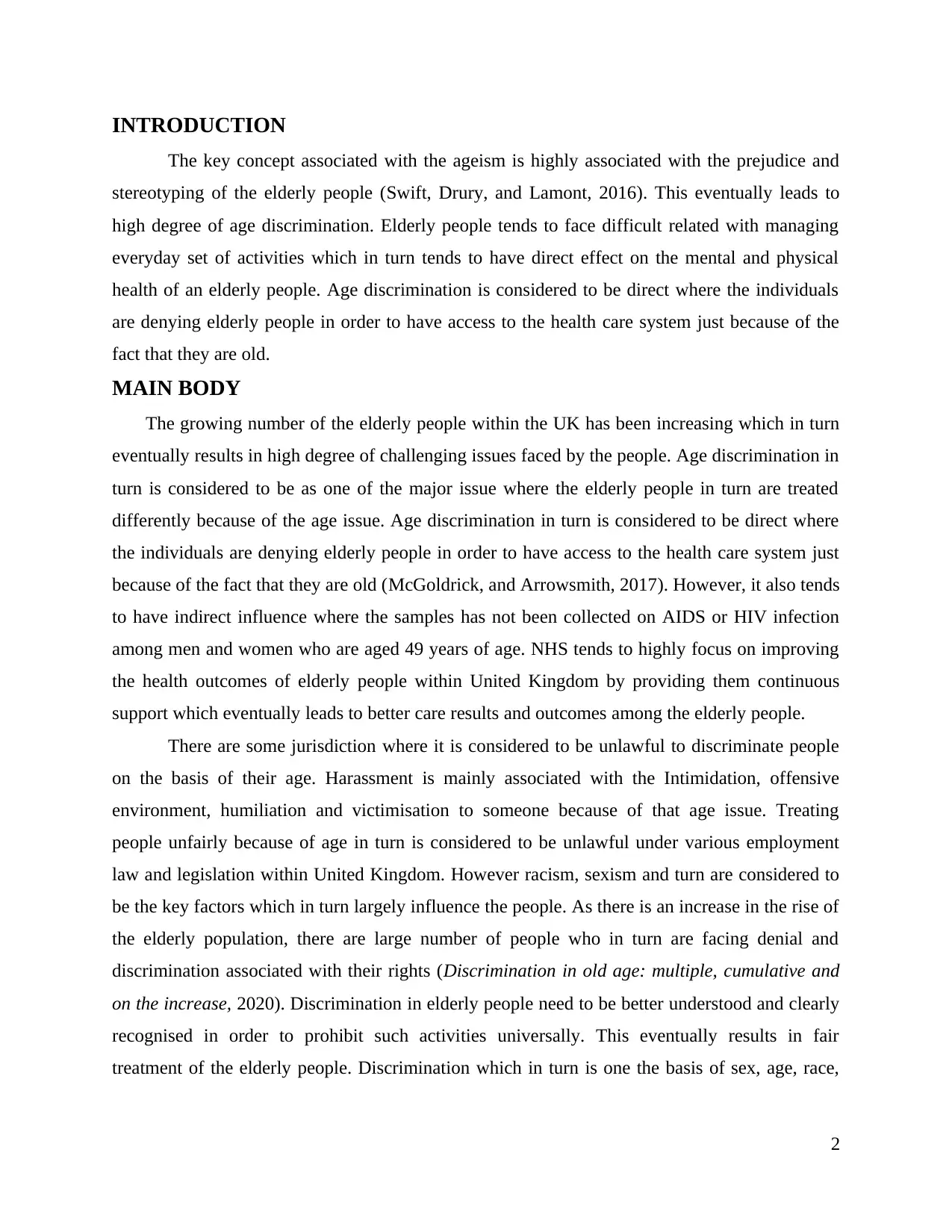
INTRODUCTION
The key concept associated with the ageism is highly associated with the prejudice and
stereotyping of the elderly people (Swift, Drury, and Lamont, 2016). This eventually leads to
high degree of age discrimination. Elderly people tends to face difficult related with managing
everyday set of activities which in turn tends to have direct effect on the mental and physical
health of an elderly people. Age discrimination is considered to be direct where the individuals
are denying elderly people in order to have access to the health care system just because of the
fact that they are old.
MAIN BODY
The growing number of the elderly people within the UK has been increasing which in turn
eventually results in high degree of challenging issues faced by the people. Age discrimination in
turn is considered to be as one of the major issue where the elderly people in turn are treated
differently because of the age issue. Age discrimination in turn is considered to be direct where
the individuals are denying elderly people in order to have access to the health care system just
because of the fact that they are old (McGoldrick, and Arrowsmith, 2017). However, it also tends
to have indirect influence where the samples has not been collected on AIDS or HIV infection
among men and women who are aged 49 years of age. NHS tends to highly focus on improving
the health outcomes of elderly people within United Kingdom by providing them continuous
support which eventually leads to better care results and outcomes among the elderly people.
There are some jurisdiction where it is considered to be unlawful to discriminate people
on the basis of their age. Harassment is mainly associated with the Intimidation, offensive
environment, humiliation and victimisation to someone because of that age issue. Treating
people unfairly because of age in turn is considered to be unlawful under various employment
law and legislation within United Kingdom. However racism, sexism and turn are considered to
be the key factors which in turn largely influence the people. As there is an increase in the rise of
the elderly population, there are large number of people who in turn are facing denial and
discrimination associated with their rights (Discrimination in old age: multiple, cumulative and
on the increase, 2020). Discrimination in elderly people need to be better understood and clearly
recognised in order to prohibit such activities universally. This eventually results in fair
treatment of the elderly people. Discrimination which in turn is one the basis of sex, age, race,
2
The key concept associated with the ageism is highly associated with the prejudice and
stereotyping of the elderly people (Swift, Drury, and Lamont, 2016). This eventually leads to
high degree of age discrimination. Elderly people tends to face difficult related with managing
everyday set of activities which in turn tends to have direct effect on the mental and physical
health of an elderly people. Age discrimination is considered to be direct where the individuals
are denying elderly people in order to have access to the health care system just because of the
fact that they are old.
MAIN BODY
The growing number of the elderly people within the UK has been increasing which in turn
eventually results in high degree of challenging issues faced by the people. Age discrimination in
turn is considered to be as one of the major issue where the elderly people in turn are treated
differently because of the age issue. Age discrimination in turn is considered to be direct where
the individuals are denying elderly people in order to have access to the health care system just
because of the fact that they are old (McGoldrick, and Arrowsmith, 2017). However, it also tends
to have indirect influence where the samples has not been collected on AIDS or HIV infection
among men and women who are aged 49 years of age. NHS tends to highly focus on improving
the health outcomes of elderly people within United Kingdom by providing them continuous
support which eventually leads to better care results and outcomes among the elderly people.
There are some jurisdiction where it is considered to be unlawful to discriminate people
on the basis of their age. Harassment is mainly associated with the Intimidation, offensive
environment, humiliation and victimisation to someone because of that age issue. Treating
people unfairly because of age in turn is considered to be unlawful under various employment
law and legislation within United Kingdom. However racism, sexism and turn are considered to
be the key factors which in turn largely influence the people. As there is an increase in the rise of
the elderly population, there are large number of people who in turn are facing denial and
discrimination associated with their rights (Discrimination in old age: multiple, cumulative and
on the increase, 2020). Discrimination in elderly people need to be better understood and clearly
recognised in order to prohibit such activities universally. This eventually results in fair
treatment of the elderly people. Discrimination which in turn is one the basis of sex, age, race,
2
Paraphrase This Document
Need a fresh take? Get an instant paraphrase of this document with our AI Paraphraser
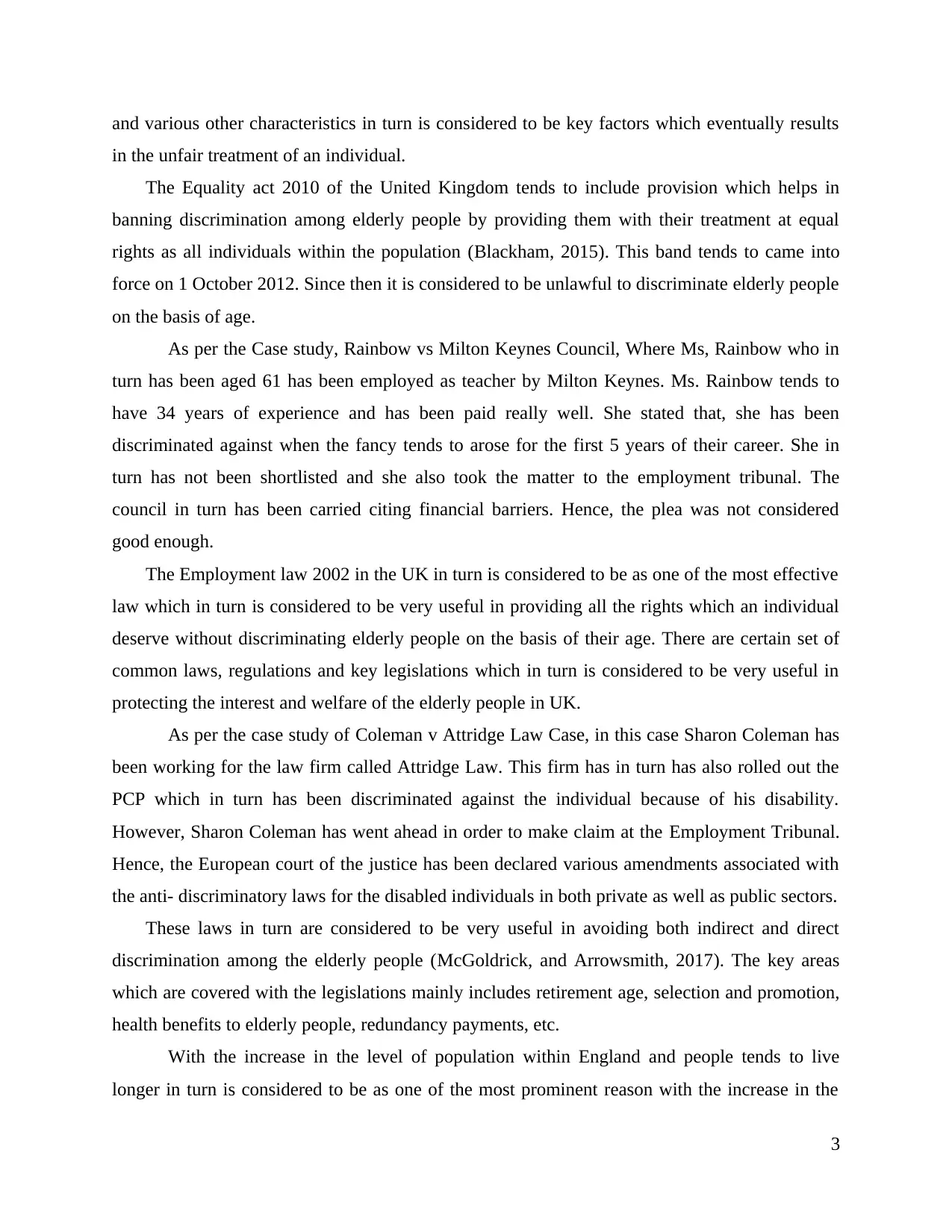
and various other characteristics in turn is considered to be key factors which eventually results
in the unfair treatment of an individual.
The Equality act 2010 of the United Kingdom tends to include provision which helps in
banning discrimination among elderly people by providing them with their treatment at equal
rights as all individuals within the population (Blackham, 2015). This band tends to came into
force on 1 October 2012. Since then it is considered to be unlawful to discriminate elderly people
on the basis of age.
As per the Case study, Rainbow vs Milton Keynes Council, Where Ms, Rainbow who in
turn has been aged 61 has been employed as teacher by Milton Keynes. Ms. Rainbow tends to
have 34 years of experience and has been paid really well. She stated that, she has been
discriminated against when the fancy tends to arose for the first 5 years of their career. She in
turn has not been shortlisted and she also took the matter to the employment tribunal. The
council in turn has been carried citing financial barriers. Hence, the plea was not considered
good enough.
The Employment law 2002 in the UK in turn is considered to be as one of the most effective
law which in turn is considered to be very useful in providing all the rights which an individual
deserve without discriminating elderly people on the basis of their age. There are certain set of
common laws, regulations and key legislations which in turn is considered to be very useful in
protecting the interest and welfare of the elderly people in UK.
As per the case study of Coleman v Attridge Law Case, in this case Sharon Coleman has
been working for the law firm called Attridge Law. This firm has in turn has also rolled out the
PCP which in turn has been discriminated against the individual because of his disability.
However, Sharon Coleman has went ahead in order to make claim at the Employment Tribunal.
Hence, the European court of the justice has been declared various amendments associated with
the anti- discriminatory laws for the disabled individuals in both private as well as public sectors.
These laws in turn are considered to be very useful in avoiding both indirect and direct
discrimination among the elderly people (McGoldrick, and Arrowsmith, 2017). The key areas
which are covered with the legislations mainly includes retirement age, selection and promotion,
health benefits to elderly people, redundancy payments, etc.
With the increase in the level of population within England and people tends to live
longer in turn is considered to be as one of the most prominent reason with the increase in the
3
in the unfair treatment of an individual.
The Equality act 2010 of the United Kingdom tends to include provision which helps in
banning discrimination among elderly people by providing them with their treatment at equal
rights as all individuals within the population (Blackham, 2015). This band tends to came into
force on 1 October 2012. Since then it is considered to be unlawful to discriminate elderly people
on the basis of age.
As per the Case study, Rainbow vs Milton Keynes Council, Where Ms, Rainbow who in
turn has been aged 61 has been employed as teacher by Milton Keynes. Ms. Rainbow tends to
have 34 years of experience and has been paid really well. She stated that, she has been
discriminated against when the fancy tends to arose for the first 5 years of their career. She in
turn has not been shortlisted and she also took the matter to the employment tribunal. The
council in turn has been carried citing financial barriers. Hence, the plea was not considered
good enough.
The Employment law 2002 in the UK in turn is considered to be as one of the most effective
law which in turn is considered to be very useful in providing all the rights which an individual
deserve without discriminating elderly people on the basis of their age. There are certain set of
common laws, regulations and key legislations which in turn is considered to be very useful in
protecting the interest and welfare of the elderly people in UK.
As per the case study of Coleman v Attridge Law Case, in this case Sharon Coleman has
been working for the law firm called Attridge Law. This firm has in turn has also rolled out the
PCP which in turn has been discriminated against the individual because of his disability.
However, Sharon Coleman has went ahead in order to make claim at the Employment Tribunal.
Hence, the European court of the justice has been declared various amendments associated with
the anti- discriminatory laws for the disabled individuals in both private as well as public sectors.
These laws in turn are considered to be very useful in avoiding both indirect and direct
discrimination among the elderly people (McGoldrick, and Arrowsmith, 2017). The key areas
which are covered with the legislations mainly includes retirement age, selection and promotion,
health benefits to elderly people, redundancy payments, etc.
With the increase in the level of population within England and people tends to live
longer in turn is considered to be as one of the most prominent reason with the increase in the
3
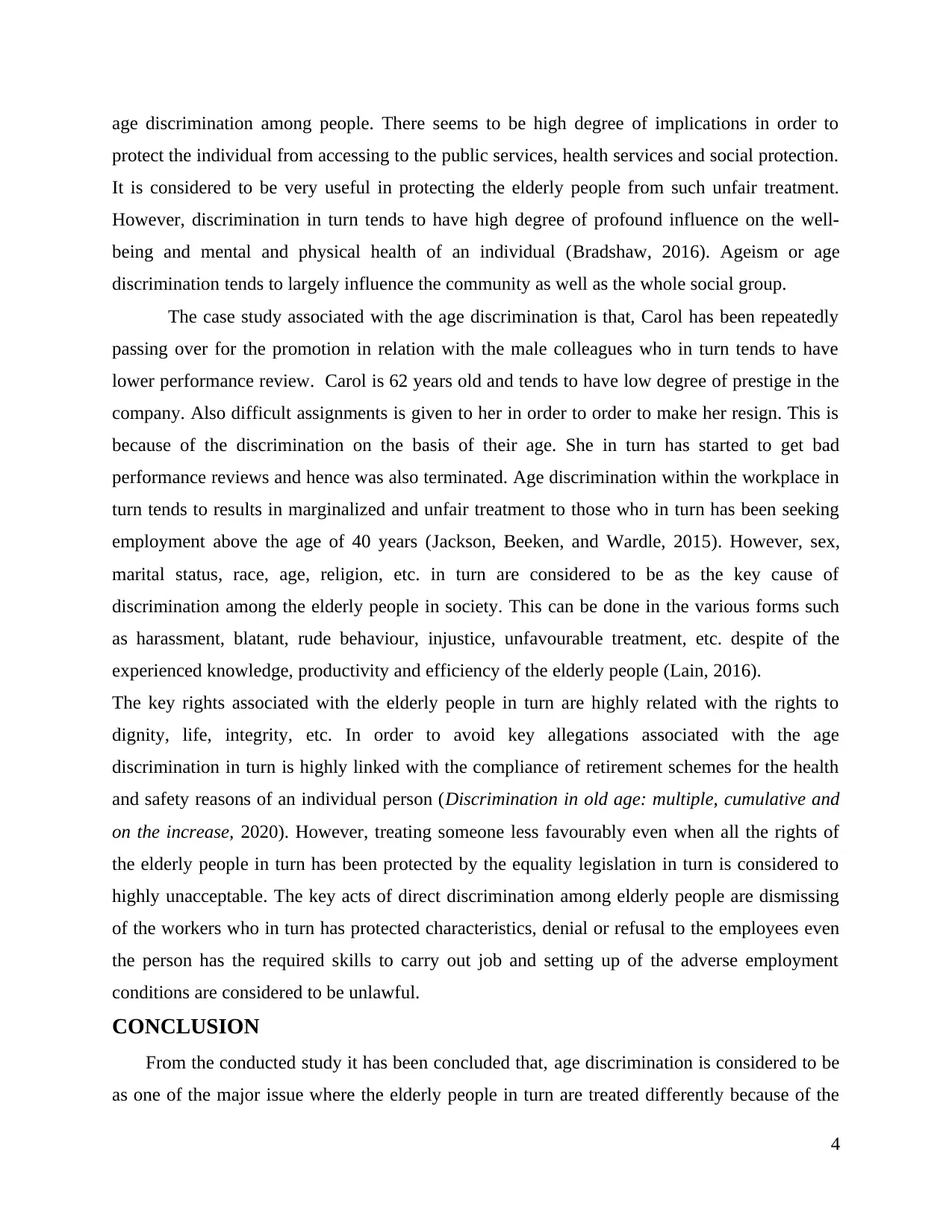
age discrimination among people. There seems to be high degree of implications in order to
protect the individual from accessing to the public services, health services and social protection.
It is considered to be very useful in protecting the elderly people from such unfair treatment.
However, discrimination in turn tends to have high degree of profound influence on the well-
being and mental and physical health of an individual (Bradshaw, 2016). Ageism or age
discrimination tends to largely influence the community as well as the whole social group.
The case study associated with the age discrimination is that, Carol has been repeatedly
passing over for the promotion in relation with the male colleagues who in turn tends to have
lower performance review. Carol is 62 years old and tends to have low degree of prestige in the
company. Also difficult assignments is given to her in order to order to make her resign. This is
because of the discrimination on the basis of their age. She in turn has started to get bad
performance reviews and hence was also terminated. Age discrimination within the workplace in
turn tends to results in marginalized and unfair treatment to those who in turn has been seeking
employment above the age of 40 years (Jackson, Beeken, and Wardle, 2015). However, sex,
marital status, race, age, religion, etc. in turn are considered to be as the key cause of
discrimination among the elderly people in society. This can be done in the various forms such
as harassment, blatant, rude behaviour, injustice, unfavourable treatment, etc. despite of the
experienced knowledge, productivity and efficiency of the elderly people (Lain, 2016).
The key rights associated with the elderly people in turn are highly related with the rights to
dignity, life, integrity, etc. In order to avoid key allegations associated with the age
discrimination in turn is highly linked with the compliance of retirement schemes for the health
and safety reasons of an individual person (Discrimination in old age: multiple, cumulative and
on the increase, 2020). However, treating someone less favourably even when all the rights of
the elderly people in turn has been protected by the equality legislation in turn is considered to
highly unacceptable. The key acts of direct discrimination among elderly people are dismissing
of the workers who in turn has protected characteristics, denial or refusal to the employees even
the person has the required skills to carry out job and setting up of the adverse employment
conditions are considered to be unlawful.
CONCLUSION
From the conducted study it has been concluded that, age discrimination is considered to be
as one of the major issue where the elderly people in turn are treated differently because of the
4
protect the individual from accessing to the public services, health services and social protection.
It is considered to be very useful in protecting the elderly people from such unfair treatment.
However, discrimination in turn tends to have high degree of profound influence on the well-
being and mental and physical health of an individual (Bradshaw, 2016). Ageism or age
discrimination tends to largely influence the community as well as the whole social group.
The case study associated with the age discrimination is that, Carol has been repeatedly
passing over for the promotion in relation with the male colleagues who in turn tends to have
lower performance review. Carol is 62 years old and tends to have low degree of prestige in the
company. Also difficult assignments is given to her in order to order to make her resign. This is
because of the discrimination on the basis of their age. She in turn has started to get bad
performance reviews and hence was also terminated. Age discrimination within the workplace in
turn tends to results in marginalized and unfair treatment to those who in turn has been seeking
employment above the age of 40 years (Jackson, Beeken, and Wardle, 2015). However, sex,
marital status, race, age, religion, etc. in turn are considered to be as the key cause of
discrimination among the elderly people in society. This can be done in the various forms such
as harassment, blatant, rude behaviour, injustice, unfavourable treatment, etc. despite of the
experienced knowledge, productivity and efficiency of the elderly people (Lain, 2016).
The key rights associated with the elderly people in turn are highly related with the rights to
dignity, life, integrity, etc. In order to avoid key allegations associated with the age
discrimination in turn is highly linked with the compliance of retirement schemes for the health
and safety reasons of an individual person (Discrimination in old age: multiple, cumulative and
on the increase, 2020). However, treating someone less favourably even when all the rights of
the elderly people in turn has been protected by the equality legislation in turn is considered to
highly unacceptable. The key acts of direct discrimination among elderly people are dismissing
of the workers who in turn has protected characteristics, denial or refusal to the employees even
the person has the required skills to carry out job and setting up of the adverse employment
conditions are considered to be unlawful.
CONCLUSION
From the conducted study it has been concluded that, age discrimination is considered to be
as one of the major issue where the elderly people in turn are treated differently because of the
4
⊘ This is a preview!⊘
Do you want full access?
Subscribe today to unlock all pages.

Trusted by 1+ million students worldwide

age issue. It has been evaluated that, Discrimination in elderly people need to be better
understood and clearly recognised in order to prohibit such activities universally. The Equality
act 2010 of the United Kingdom and The Employment law 2002 in the UK are considered to be
as key laws providing all the rights which an individual deserve without discriminating elderly
people on the basis of their age.
5
understood and clearly recognised in order to prohibit such activities universally. The Equality
act 2010 of the United Kingdom and The Employment law 2002 in the UK are considered to be
as key laws providing all the rights which an individual deserve without discriminating elderly
people on the basis of their age.
5
Paraphrase This Document
Need a fresh take? Get an instant paraphrase of this document with our AI Paraphraser
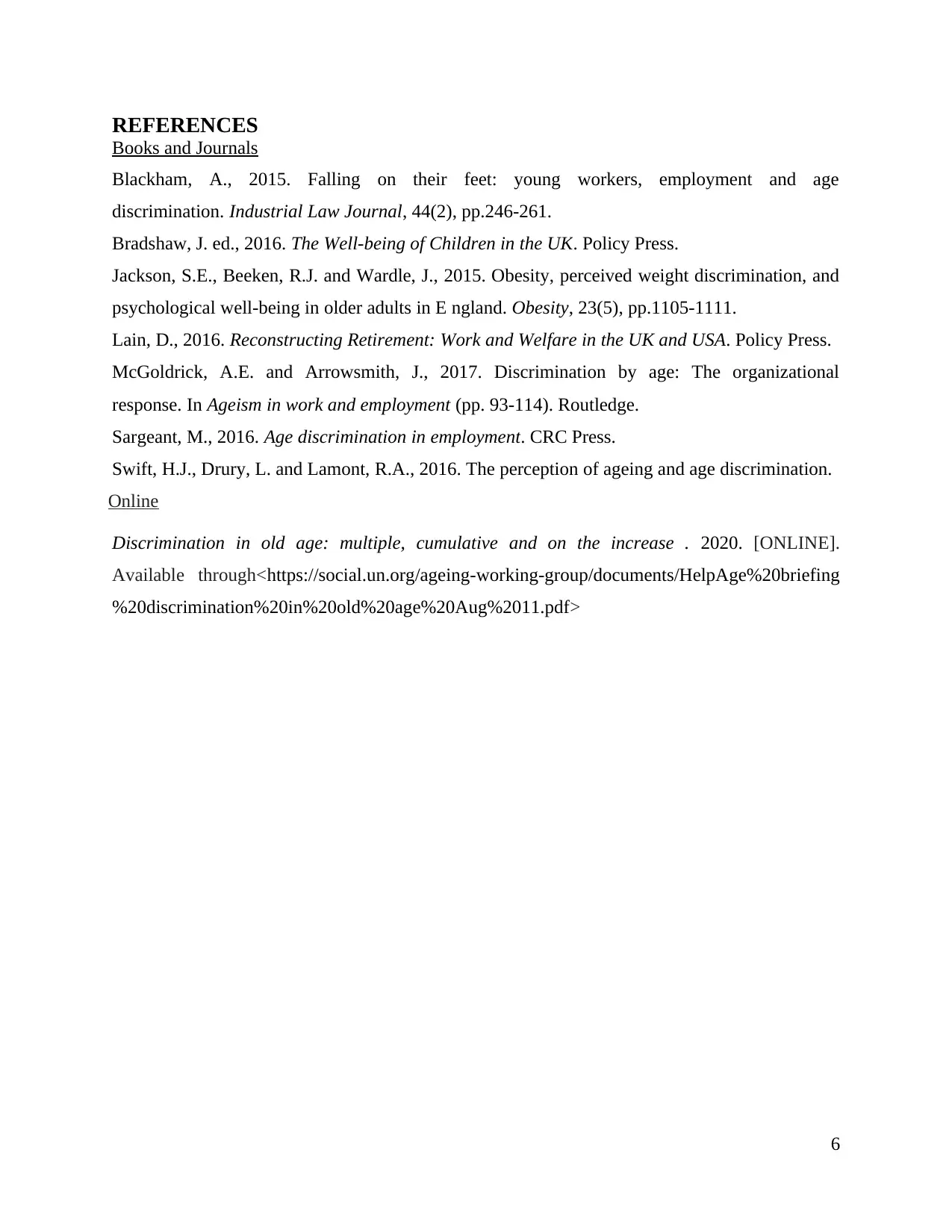
REFERENCES
Books and Journals
Blackham, A., 2015. Falling on their feet: young workers, employment and age
discrimination. Industrial Law Journal, 44(2), pp.246-261.
Bradshaw, J. ed., 2016. The Well-being of Children in the UK. Policy Press.
Jackson, S.E., Beeken, R.J. and Wardle, J., 2015. Obesity, perceived weight discrimination, and
psychological well‐being in older adults in E ngland. Obesity, 23(5), pp.1105-1111.
Lain, D., 2016. Reconstructing Retirement: Work and Welfare in the UK and USA. Policy Press.
McGoldrick, A.E. and Arrowsmith, J., 2017. Discrimination by age: The organizational
response. In Ageism in work and employment (pp. 93-114). Routledge.
Sargeant, M., 2016. Age discrimination in employment. CRC Press.
Swift, H.J., Drury, L. and Lamont, R.A., 2016. The perception of ageing and age discrimination.
Online
Discrimination in old age: multiple, cumulative and on the increase . 2020. [ONLINE].
Available through<https://social.un.org/ageing-working-group/documents/HelpAge%20briefing
%20discrimination%20in%20old%20age%20Aug%2011.pdf>
6
Books and Journals
Blackham, A., 2015. Falling on their feet: young workers, employment and age
discrimination. Industrial Law Journal, 44(2), pp.246-261.
Bradshaw, J. ed., 2016. The Well-being of Children in the UK. Policy Press.
Jackson, S.E., Beeken, R.J. and Wardle, J., 2015. Obesity, perceived weight discrimination, and
psychological well‐being in older adults in E ngland. Obesity, 23(5), pp.1105-1111.
Lain, D., 2016. Reconstructing Retirement: Work and Welfare in the UK and USA. Policy Press.
McGoldrick, A.E. and Arrowsmith, J., 2017. Discrimination by age: The organizational
response. In Ageism in work and employment (pp. 93-114). Routledge.
Sargeant, M., 2016. Age discrimination in employment. CRC Press.
Swift, H.J., Drury, L. and Lamont, R.A., 2016. The perception of ageing and age discrimination.
Online
Discrimination in old age: multiple, cumulative and on the increase . 2020. [ONLINE].
Available through<https://social.un.org/ageing-working-group/documents/HelpAge%20briefing
%20discrimination%20in%20old%20age%20Aug%2011.pdf>
6
1 out of 8
Related Documents
Your All-in-One AI-Powered Toolkit for Academic Success.
+13062052269
info@desklib.com
Available 24*7 on WhatsApp / Email
![[object Object]](/_next/static/media/star-bottom.7253800d.svg)
Unlock your academic potential
Copyright © 2020–2025 A2Z Services. All Rights Reserved. Developed and managed by ZUCOL.





